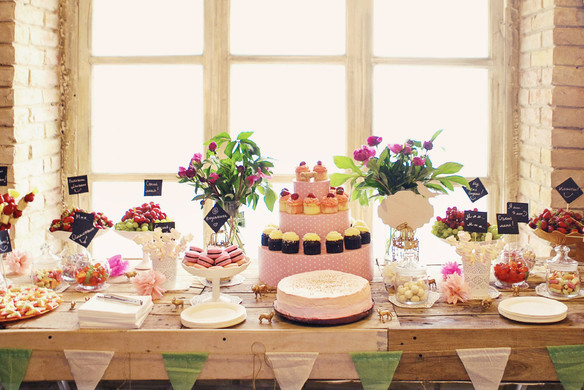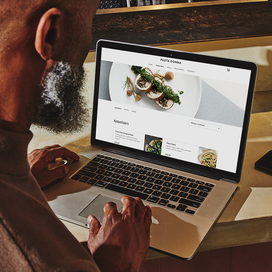Table of contents
The wedding industry can be a tough nut to crack. So if you’re
a florist, hair stylist, DJ, or events space, you’ll want to do your homework before you dive in. Luckily, we have Alan Berg—who’s been called “The Leading International Expert on the Business of Wedding and Events” here to walk you through the basics.
Berg regularly speaks at wedding industry conferences around the world, was the Vice President of Sales at The Knot, and now is a contributing ‘Education Guru’ to the site Wedding Wire. So needless to say, he knows his stuff. Here’s our conversation:
Square: What’s the biggest mistake people make when they decide to go into the wedding business?
Berg: Often times, people come in starry eyed, and don’t think about the business side of things. The economics of the wedding events industry makes more sense at a higher price points than at a low price point. You can’t just go into it thinking “I’m just going to make some extra cash.” It’s a real time business and you have to treat it as one. And if you want others to invest in you, you have to invest in yourself.
What’s the first thing you should invest in?
A professional-looking site. Think of it as the equivalent as “dress for success” for your business. Also, make sure that you get an email address that matches up with your website. If you hand someone a business card and it just has your personal Gmail address, or even worse, an AOL address, people aren’t going to take you seriously. What comes after the @ part of your email address should be the same name as your business. Remember, you don’t get credit for doing it right but you lose points for doing it wrong.
What sort of things should you be thinking about as you design your website?
Your website should be the centralized hub for everything you do. You don’t have to invest $10K in it, but you have to do it better than the basic free templates that are offered. All of your advertising and social media should link to your website. Your site should look clean and be easy to navigate. It’s all about usability and how that relates to getting you clients. In fact, I wrote an entire book called: If Your Website Was an Employee Would you Fire It?
Aside from usability, what are some other website must-haves?
There are four elements that will make the pages on your website work better:
- An aspirational image.
You want people to look at the photos on your site and have the reaction “I want to look like the people in those pictures.” That means no empty banquet rooms or ceremony site photos — and certainly no brides with their heads cut off. You want people to be able to visualize photos on their Facebook page and wedding album. And to think, “If I hire that person, I’ll get that result.” You want people smiling and having a good time. - Talk to them, about them.
All of your text should be written for the people who are reading it. Don’t just say what you do. Frame it as: “this is what you’re going to get because we’ve done this for other couples.” Use the words “you” and “your” more than “I” and “we,” referring to yourself. Sell the outcome, not the service or the process. - Include testimonials.
Infuse quotes by real customers who have experienced exactly what you’re talking about in point #2, and do that on every page. They say it better than you can because it’s their real experience. And always use attribution. I like first name, city and state. That’ll get you a little SEO lift as well. - Call to action.
Tell people exactly what to do as a next step—whether it’s to call, text or email you. And if you say call or text, include your phone number, no matter how many times it’s already on the page. If you want more inquiries I recommend using short contact forms on every page. One of my clients got 2x more inquiries than the year before by shortening his contact form and putting it on every page.
Are there any shining examples of websites that do all the things you’re talking about?
While all sites are a work in progress, here are a few I regularly use as examples. One of my clients is an officiant in Washington DC. His site progressivecatholics.org is great. It has all the elements—text that talks to people conversationally, great imagery where he’s not the focus and calls to action many times on each page. Two other examples that come to mind are detroityachtwedding.com, a wedding venue, and drsmusic.com, which is a wedding band in Chicago. They do lots of things right, as well.
Wedding fairs also seem important. What’s the strategy there?
If you attend fairs, besides meeting engaged brides and grooms, other wedding vendors will see that you’re a legitimate player. People refer people who they know, like, and trust. And they’re not going to trust you if you’ve never met them and you’re not out networking. So don’t just show up to an event, give out business cards, and leave. I published “six steps to wedding show success” on my blog last year, if you want to see some more tips.
What are the biggest mistakes people make?
Not preparing your booth or staffing properly. When someone walks up to your booth, they should immediately know who you are what what you do. You also need to be staffed so that you can make appointments at the show. You’ll want to set up 1:1s with people who are interested, since you won’t be able to spend that much time with each person at the event.
Get Started with Square Appointments.
Scheduling software that brings in more business.
What are some other things people may not realize?
You need to prep for the show, but also prep for the follow-up. Decide how you want to get in touch with people afterwards—whether it’s through direct mail, email, or phone calls. Or maybe you can schedule your own open house or showcase after the show and get couples to register for it at the wedding fair.
How should you network?
You want to align yourself with other vendors, especially those outside of your category. Find out what the networking groups are in your area, and volunteer at them. The National Association of Catering and Events (NACE) and Wedding Network USA are good places to start. Like I said, people refer people who they know, like and trust — so the time investment is worth it…if you show up.
![]()











